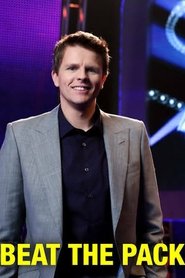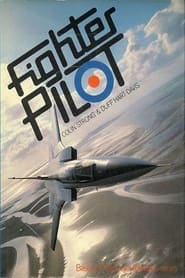Bbc One TV Series - Page 117
-
Beat the Pack
0000
Beat the Pack
0000
Beat the Pack is a BBC quiz show that aired on BBC One since 4 March 2013, hosted by Jake Humphrey. -
Fighter Pilot
1981
Fighter Pilot
1981
The BBC cameras follow an ever diminishing band of students through 3 years of training and selection. -
The Unsellables
0000
star 6The Unsellables is a British reality game show that debuted on 11 May 2009. The television series ended on 5 June 2009. The show aired on BBC One, the television show was also distributed by the BBC. The Unsellables focuses on helping people who have troubles selling their houses. The Unsellables is a Housing/Building lifestyle type game show. The television series was based on the original Canadian version of the series. -
Stay Tooned!
0000
Stay Tooned!
0000
Stay Tooned is a series presented by Tony Robinson, in which he discusses in more details and explains in some depth about cartoon characters, the people behind the cartoons, studios, and also looks over the history as well. Unlike Rolf Harris - Cartoon Time, in which he performed as filler between the cartoons, Tony Robinson tried to provide greater details about the particular topic which he would focus on each week. This meant that he range of depth of the series grow far wider that just run of the mill classics, and on occasions featured more obsure cartoons including Betty Boop, Animal Farm, and one made by independent producers . -
Accidental Farmer
2010
Accidental Farmer
2010
Accidental Farmer is a television drama by broadcast on BBC1 on 21 December 2010. It is about a London-based advertising executive who moves to a farm in Yorkshire after buying it with her boyfriend's credit card as revenge for cheating on her; and the rigours and problems she encounters on the farm, particularly from being unfamiliar with the rural setting. It is a comedy drama starring Ashley Jensen as the main character, Erin Taylor. -
Wreck or Ready?
2011
Wreck or Ready?
2011
-
The Nigel Barton Plays
0000
The Nigel Barton Plays are two semi-autobiographical television dramas by Dennis Potter, first broadcast on BBC1 in 1965 as part of The Wednesday Play strand. The first play, Stand Up, Nigel Barton, follows the eponymous character's journey from his childhood in a small mining community to winning a scholarship for Oxford, while the second play, Vote, Vote, Vote for Nigel Barton, sees him standing for Parliament as the Labour Party candidate in a by-election. Both plays develop themes and use dramatic devices that became hallmarks of Potter's later plays for television. -
Blue Peter Special Assignment
0000
Blue Peter Special Assignment was a factual BBC TV series broadcast in the 1970s and early 1980s, the first spin-off from the long running BBC series Blue Peter. It ran regularly from 1973 until 1981, usually at weekends on BBC1, and was heavily promoted on Blue Peter itself. The concept for the series was developed after Valerie Singleton had made a successful documentary 'special' with HRH Princess Anne when she had visited Kenya in 1971. The Special Assignment series was mainly produced by Edward Barnes and presented initially by Valerie Singleton and later by Peter Purves, Lesley Judd and reportedly Simon Groom, all of whom had been presenters on Blue Peter itself. Series One featured Valerie Singleton looking at six European Capital Cities. These included Rome, Paris, London, Edinburgh, Amsterdam and Brussels. The first programme to be filmed was the one featuring Rome and included a personal address to the children of Britain from Pope Paul VI in The Vatican. Series Two continued to feature Singleton lookin -
First Class
0000
First Class
0000
First Class was a 1980s BBC TV game show hosted by Debbie Greenwood. The show was broadcast on Friday evenings on BBC 1 and ran for at least three series. Two teams of three students would take part in a multi-format quiz featuring questions on both general knowledge and popular culture, as well as innovative video game rounds. Rounds such as the "Spinning Gold Disc" made use of a simulated computer display similar to other game shows of the same era, such as Blockbusters and Catchphrase. Other rounds such as "Word of Mouth" used a real computer display from a BBC Micro. This computer also provided the on-screen captions and scores and was nicknamed Eugene, after the show's original programmer Eugene Crozier. The competition was a knockout tournament; the eventual winners of the series would be presented with a computer for their school. Celebrity episodes of the show were also aired, featuring cast members from Grange Hill and EastEnders. First Class was notable for its use of video games; such footage was a rar -
The Brain Hospital
2006
The Brain Hospital
2006
-
Alexei Sayle's Liverpool
2008
Alexei Sayle returns to Liverpool to examine his troubled relationship with the city by meeting those who have played a role in its recent history -
Missing Live
0000
Missing Live
0000
Missing, titled Missing Live from 2008–2010, is a BBC One morning television series which has been running since 2005. It is currently presented Louise Minchin and Rav Wilding, who replaced Sally Magnusson in 2008. The fifth series adopted a live studio style as opposed to the pre-recorded, docu-drama, style of the previous series. The seventh series returned to the original style and was pre-recorded and presented solely by Louise Minchin. -
It'll Never Work
0000
It'll Never Work
0000
It'll Never Work was a television programme for children showcasing new inventions and developments in scientific technology. Produced by Roy Milani for BBC Children's, the show ran for seven series between 9 November 1993 and 23 August 1999 on weekdays within the Children's BBC, later CBBC, strand on BBC One. It'll Never Work was presented throughout its run by children's television presenter Sally Gray, who would go on to present children's quiz 50/50, Jez Nelson, who would go on to front the related primetime BBC technology series Tomorrow's World, and science presenter Angela Lamont. This team was augmented during later series by presenters Adrian Johnson and Rick Adams. For each episode the presenters travelled worldwide to discover new gadgets and to test out whether new inventions worked or not, hence the show's title. Depeche Mode's 1984 hit single "People Are People" was used as the theme music. The show was critically and commercially lauded, winning the 1994 BAFTA TV Award in the category of 'Best Chil -
Breakfast with Frost
0000
Breakfast with Frost
0000
Breakfast with Frost was a BBC current affairs television programme hosted by Sir David Frost on Sunday mornings. The programme covered the main political news of the day while analysing the coverage of the week's news events. -
Galloping Galaxies!
0000
Galloping Galaxies!
0000
Galloping Galaxies! is a British children's television series set on a spaceship that was shown on the BBC from October 1985 and ran for ten episodes. It was created by Bob Block, also the creator of Rentaghost. It featured Kenneth Williams as the voice of the ship's computer SID, in one of his final roles. -
Hard Sell
0000
Hard Sell
0000
Hard Sell is a British reality television series which began showing in October 2006 on BBC One, produced by BBC Bristol and presented by Mark Franks. In the show two teams have to sell a collection of items for the greatest price possible. -
Earthfasts
0000
Earthfasts
0000
Earthfasts is a BBC children's drama series based upon the 1966 book of the same title by William Mayne. It was filmed on location in Richmond and Wensleydale, North Yorkshire, and was aired in 1994. -
See It Saw It
0000
See It Saw It
0000
See It Saw It was a Children's BBC game show about a king who rules over the kingdom of "Much Jollity-On-The-Mirth". It ran from 6 January 1999 to 26 March 2001. The programme was filmed entirely in the studio with an audience of children who at various points in the show would be asked an observation question by the King, which they would answer by climbing on board a giant see-saw. The majority answer would be indicated by which way the see-saw tipped. The show's main catchphrase was "Did you see it?" asked by the king, to which the audience would shout back, "We saw it!". The show was created and produced by Clive Doig, and most of the cast had also appeared in previous shows created by Doig: Mark Speight and Philip Fox were both part of the supporting cast in the GMTV programme Eat Your Words, while both Sylvester McCoy and Julia Binsted had long histories of working with Doig, both having appeared in the classic series Jigsaw in the 1980s. The only newcomer in the main cast was Natasha Collins as the jester S -
Dooby Duck's Disco Bus
0000
Dooby Duck's Disco Bus was a children's puppet show presented by Dooby Duck, a puppet duck with a shiny showbiz jacket, and a pink bow-tie who introduced puppets singing contemporary songs of the day. Dooby signed off each show laughing and saying 'Dooby Dooby Dooby Dooby Quack Quack' whilst admiring a picture of Tanita Tikaram. The character first appeared as a segment on the children's sketch programme 'The Satellite Show'.



